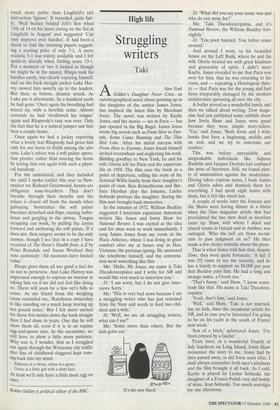High life
Struggling writers
Taki
Soldier's Daughter Never Cries, an autobiographical novel about growing up as the daughter of the author James Jones, has inspired the latest film by Merchant Ivory. The novel was written by Kaylie Jones, and the movie — set in Paris — has just opened in the Big Bagel. James Jones wrote big novels such as From Here to Eter- nity, Some Came Running and The Thin Red Line. After his initial success with From Here to Eternity, Jones found himself invited everywhere and neglecting his work. Bidding goodbye to New York, he and his wife Gloria left for Paris and the expatriate life in 1958. The film uses the book as a point of departure, telling the story of the fictional Willis family from their daughter's point of view. Kris Kristofferson and Bar- bara Hershey play the Joneses, Leelee Sobieski portrays the daughter. Seeing the film sure brought back memories.
In the autumn of 1972, William Buckley suggested I interview expatriate American writers like Jones and Irwin Shaw for National Review. I was excited at the idea and for once went to work immediately. I rang James Jones from my room at the Plaza Athenee, where I was living in great comfort after my al fresco stay in Hue, Vietnam, the previous spring. He answered the telephone himself, and the conversa- tion went something like this: Me: 'Hello, Mr Jones, my name is Taki Theodoracopulos and I write for NR and would like very much to interview you.'
JJ: 'I am sorry, but I do not give inter- views. Sorry.'
Me: 'This is very bad news because I am a struggling writer who has just returned from the Nam and needs to feed two chil- dren and a wife.'
JJ: 'Well,. we are all struggling writers, what can I say?'
Me: 'Some more than others. But the kids gotta eat.'
It's the new black ' JJ: 'What did you say your name was and who do you write for?'
Me: Taki Theodoracopulos, and it's National Review, the William Buckley fort- nightly.'
JJ: 'You poor bastard. You better come around.'
And around I went, to his beautiful house on the Left Bank, where he and his wife Gloria treated me with great kindness and generosity of spirit. I didn't meet Kaylie. Jones revealed to me that Paris was over for him, that he was returning to his roots, and — repeating a Hemingway theo- ry — that Paris was for the young and had been irreparably damaged by the modern architecture sprouting all over the city.
A butler served us a wonderful lunch, and then we talked about writing. Time maga- zine had just published some rubbish about how Irwin Shaw and Jones were passé because they were simple story-tellers. `Yes,' said Jones, 'Both Irwin and I write books that have a beginning, middle and an end, and we try to entertain our readers.'
This was before unreadable and unspeakable individuals like Salman Rushdie and Jacques Derrida had confused the issue of literature. Still, we found plen- ty of ammunition against the modernists. Having taken copious notes, I bade James and Gloria adieu and thanked them for everything. I had spent eight hours with them, but it felt like much less.
A couple of weeks later the Joneses and the Shaws were having dinner in a bistro when the Time magazine article that had proclaimed the two men dead as novelists came up. Shaw, with whom I skied and played tennis in Gstaad and in Antibes, was outraged. 'Who the hell are those no-tal- ents to pass judgment on us?' He then made a few choice remarks about the press.
That is when Jones told him that, despite Time, they were quite fortunate. 'A kid [I was 35] came to see me recently, and he has a family to support on $8,000 per year that Buckley pays him. He had a long and strange name, a Greek one.'
`That's funny,' said Shaw, 'I know some- body like that. His name is Taki Theodora- copulos.'
`Yeah, that's him,' said Jones.
`Well,' said Shaw, `Taki is not married, has no kids, does the occasional article for NR, and in case you're interested I'm going to be on his yacht in the south of France next week.'
`Son of a bitch,' spluttered Jones. 'I've been conned by a fascist.'
Years later, at a wonderful Fourth of July luncheon on Long Island, Irwin Shaw recounted the story to me. Jones had by then passed away, as did Irwin soon after. I shall always remember both men's kindness and the film brought it all back. As I said, Kaylie is played by Leelee Sobieski, the daughter of a Franco-Polish very old buddy of mine, Jean Sobieski. Too much nostalgia for one afternoon.










































































 Previous page
Previous page